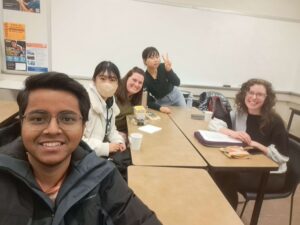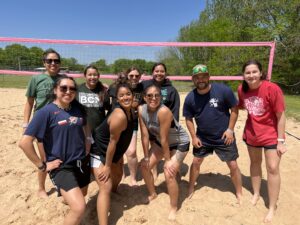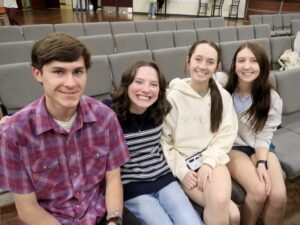In discussing how we did collegiate ministry here in Pennsylvania/South Jersey a few years back, a fellow campus minister from another region said, “We don’t do traditional Baptist collegiate ministry in our area.” That got me wondering what he meant. Was he thinking of a BSM building, with offices for paid staff and with meeting space for a weekly lunch gathering, complete with the requisite ping-pong table? If so, I’m not sure where this exists anywhere in the Emerging Regions (ER), and it may be that model is changing even across the South. If that is considered “traditional,” then it may be time to reconsider that idea.
But it did get me thinking. Even in the ER, there could be ways we’ve gotten at our mission through more “traditional” ways of thinking that may need to change. It is folly to think of tradition and change as an important discussion in more established areas and not something we in the ER must deal with. Just because we don’t have decades of “that’s the way we’ve always done it” doesn’t mean we don’t have our own strongholds. We always need to reconsider our strategies in light of changing realities.
What are some “traditional” approaches to doing collegiate ministry, even in the ER? One way has been the idea that, by default, you begin a ministry to a new campus basically by seeking to start an RSO (Recognized Student Organization) as the basis for your presence on the campus. That works, right? And we’ve done that forever, so that needs to be at the core of our strategy, right?
Well, maybe. And maybe not. What if the university simply won’t allow us to set up an RSO, something we in the ER face on a regular basis? Or what if the school places such stringent requirements in becoming an RSO that we feel we have to compromise too much of our core values and beliefs along the way , something that some schools even in the South have had to face in recent years?
Now I’m a huge supporter of our RSO approach. I am a product of a great BSU, was a BSU director for a number of years, and we continue to have a number of on-campus groups across Pennsylvania/South Jersey, led by a team of outstanding campus ministers. Such on-campus ministries exist by the boatloads all across the ER. I’m even such a believer that my essential online password pays homage to this commitment!
But I’m also a student of missional strategy, of what it means to be attuned to God’s activity and how we cooperate with God as he is active among us. I’ve tried to observe what God’s been doing among us and reflect on what it means. Which leads me to the following conclusion:
In my 35 years of serving in Baptist Collegiate Ministry, the biggest change I’ve seen in our work is that we now ask different questions when we consider what we need to do. In the past, the question might be, “How do we start a BSU/BSM/BCM/New Life/Christian Challenge, etc. on this campus?” But more and more the question now is, “How do we engage this campus community with the gospel?”
I hope you can see the difference between these two questions. The first is focused more at the 5000-ft level, with the latter being focused more at the 40,000-ft level: it covers more territory. One begins with an assumed method and drills down in search of practical solutions. The other begins with an assumed need that opens all kinds of responses. One is more tactical, and the other is more missional.
A parallel concept is that today, an effective campus minister needs to think as a missionary, first! We need to lead with missional thinking and skills, and our campus ministry skills will naturally follow. In a culture that is increasingly alien to the gospel, we need to approach our work just as our brothers and sisters who serve across the oceans have had to do for generations.
This is huge, and I hope you will allow God to help you grasp the importance of this different way of thinking.
When we consider a campus leading with the missional question, we may find that the RSO approach is indeed the best way for us to penetrate the campus with the gospel. Or it may be that if a healthy church is nearby, working to strengthen that church’s ability to minister to the campus may be in order. Or, as we are seeing across the country, it may be that a collegiate church plant is the best way forward. Or a combination of the above. Or even something else.
A dozen years ago we placed a new campus minister on one of our state schools to begin a new work. After spending several weeks on campus, he approached me and said, “There are already many Christian student groups on campus. I just don’t feel it would be the best approach to simply duplicate what they are doing. I want to find another way.” I told him that was more than acceptable. It was his job to exegete his campus and pray for God to help him discern the best way forward. There was no expectation that his ministry look and feel like anyone else’s.
So he looked for open doors, and in time found one, working with the football team. In time, he became Chaplain of the football team, which later expanded to the men’s basketball team, and finally included the ROTC. And lest you think he just did “chaplain” stuff, he found the windows in the calendar year when athletes have free time, and began taking his students on mission/service trips to the Caribbean during those windows, with many of those going not having a relationship with Jesus before they went on the trip but coming to faith while on the trip. Using this approach, he and his wife have seen scores of college athletes coming to faith in Christ over the past few years. It is an amazing story.
Another of our campus ministers leads his own campus group, but through a series of open doors has become a primary facilitator for other groups seeking to represent Christ on his campus. He has become a real influencer, a multiplier, a disciple maker of disciple makers. Although his school is a private, secular institution, the Dean of Students publicly said that their university is a better institution because of the presence of this campus minister and the influence of his students.
And there are many, many such stories to tell from across the USA and Canada. Stories from collegiate church plants with their intense focus on multiplication, stories of church plants in the community that intentionally engage the campus, stories of existing churches who dream new dreams, and stories of out of the box thinking from within an RSO context, all of which feature leaders who practice and teach their students to think as missionaries. I’m an “all hands on deck” guy, and I love to hear stories of how God is working in all kinds of collegiate ministry models and contexts. We need them all.
So is tradition dead? Some things never change. We still need to keep the Main Thing the Main Thing. In addition to asking big questions and thinking as missionaries, my observation is that those ministries have are having the greatest impact today are focused like a laser on three important behaviors: (1) missional engagement, (2) an intentional discipleship process, and (3) leadership development. And you can focus on these whether you have a building on the center of campus or meet students in a corner booth in the campus coffee shop.
There are some who say our best days are behind us. In terms of resourcing and institutional support, this might seem true. But in terms of getting on board with God’s great movement to reach the next generation, in many ways I don’t think we’ve ever been in a better place. I welcome a dialogue on the thoughts I’ve raised here, as there’s so much more to say. Contact me at [email protected]. I’d love to hear your responses.
Robert Turner is the Emerging Regions Collegiate Consultant and Collegiate Team Leader in Pennsylvania/South Jersey.







 by
by